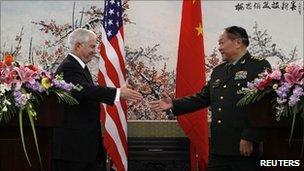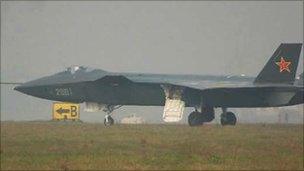Robert Gates in China: Beijing seeks to ease US fears
- Published

China told the US its military growth was consistent with its increasing global role
China's defence minister has sought to play down the country's military build-up, after talks with US counterpart Robert Gates in Beijing.
Liang Guanglie insisted China posed no threat and was decades behind nations with more advanced technology.
Mr Gates is on a four-day trip to China to cool tensions before President Hu Jintao visits the US next week.
Military ties between the two countries were briefly suspended early last year over a US sale of arms to Taiwan.
Mr Liang and Mr Gates both told journalists after their meeting that they agreed strong military co-operation should continue and should not be affected by politics.
Mr Liang said Beijing remained concerned about US dealings in Taiwan, before seeking to reassure the US about China's military ambitions.
"The efforts that we place on the research and development of weapons systems are by no means targeted at any third country," he said.
He said China's military development was "entirely appropriate and consistent with China's rise as an economic and political power".
Mr Gates said both US President Barack Obama and Chinese President Hu Jintao "clearly believe that a more robust military-to-military relationship is important".
He said he was convinced that the Chinese military leaders were "as committed to fulfilling the mandate of our two presidents" as he was.
Mr Gates will travel to South Korea and Japan later in the week, with the issue of North Korea high on the agenda.
Watching closely
Days before Mr Gates landed in Beijing, websites published pictures apparently showing a working prototype of a Chinese stealth aircraft, invisible to radar.
China has not officially commented on the photos, but they have once again put the spotlight on China's military modernisation.

Photos of a possible working prototype of a Chinese-made stealth aircraft were recently leaked
The US has the world's only operational stealth fighter, the Lockheed Martin F-22 Raptor.
In the run-up to the talks, Mr Gates said that the Chinese "clearly have potential to put some of our capabilities at risk".
"We have to pay attention to them, we have to respond appropriately with our own programmes."
The US has been watching closely as China increases its military capacity - in particular, its development of a so-called "carrier killer" missile, a land-based system which could sink an aircraft carrier from up to 1,800 miles (2,900km) away.
US battle groups - including aircraft carriers - are stationed in the South China Sea.
The US defence budget is still the biggest in the world at around $700bn, but China's is the second largest and the rate of increase may well go up this year.
China's official military budget quadrupled between 1999 and 2009 as the country's economy grew.
Last year, China announced a smaller-than-usual 7.5% increase to $76.3bn.
The BBC's Martin Patience in Beijing says there is concern in China that the US is trying to encircle it by strengthening its military alliances around the region.
In February last year, Beijing cut military ties with the US, after Washington sold $6.4bn (£4.1bn) of arms to Taiwan.
The Beijing considers the self-governed island a breakaway province - it has hundreds of missiles pointed at Taiwan and has threatened to use force to bring it under its control if it moved towards declaring formal independence.

- Published7 January 2011
- Published6 January 2011
- Published17 December 2010
- Published7 November 2010
- Published17 August 2010